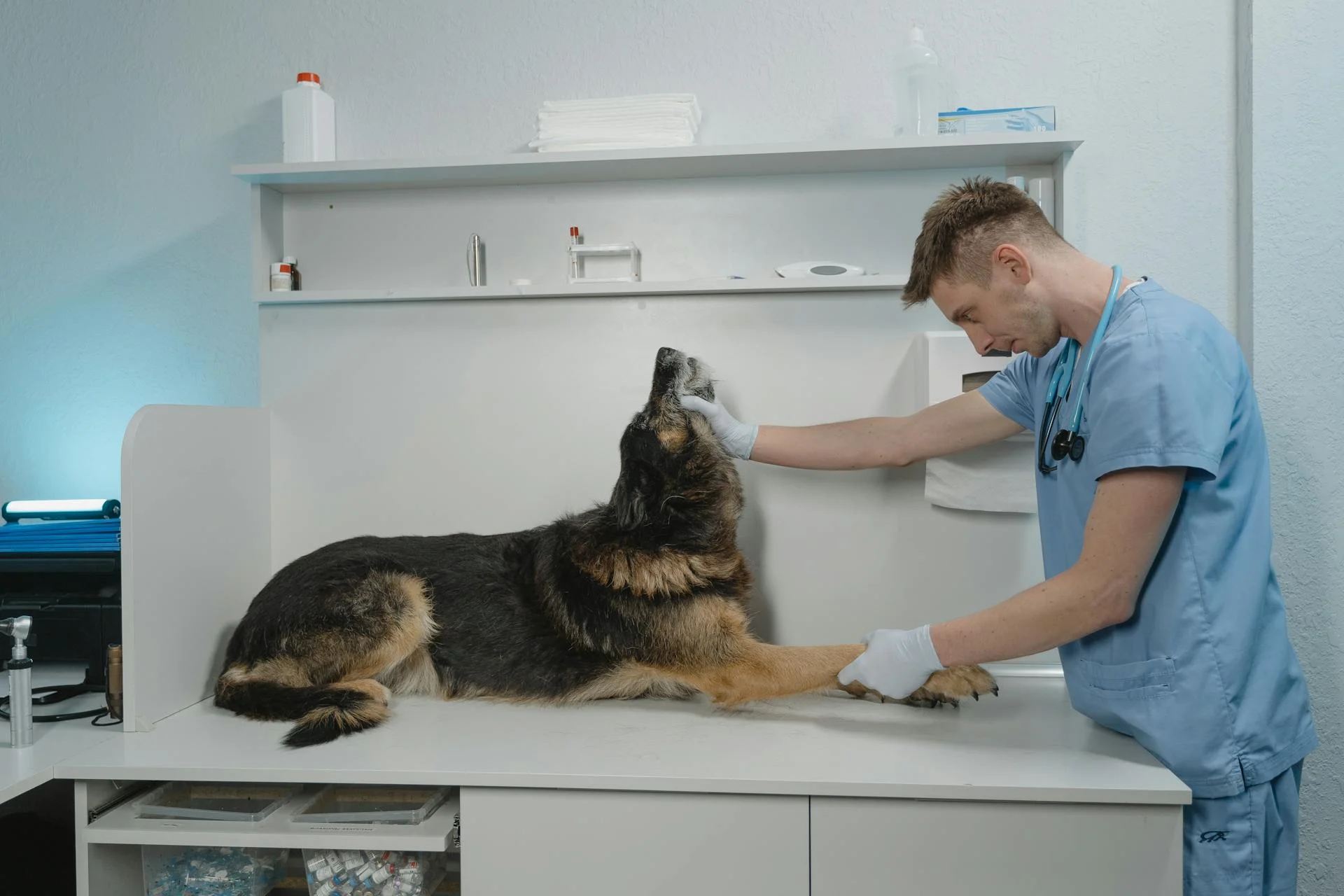
Parasites can cause seizures in dogs, and it's essential to know the signs and symptoms to provide the best care for your furry friend.
Toxoplasmosis, a parasitic infection, is a common cause of seizures in dogs. This parasite can be found in cat litter and contaminated meat, making it a risk to dogs who come into contact with these sources.
Dogs with seizures caused by parasites may exhibit unusual behaviors, such as confusion, disorientation, and loss of coordination. These symptoms can be mistaken for other conditions, so it's crucial to have your dog checked by a veterinarian if you notice any unusual behavior.
Some parasites, like heartworms, can cause seizures in dogs by damaging the brain and nervous system.
Parasites That Can Cause Seizures
Parasites can cause seizures in dogs, and it's essential to be aware of the types that can lead to this condition. Brain parasites, specifically, can invade the central nervous system and cause encephalitis, a serious condition that can be life-threatening.

Some parasites, like tapeworms, can grow to over 2 inches in diameter and cause increased pressure on the brain, leading to symptoms like loss of muscle control, blindness, and paralysis. Echinococcosis, caused by Echinococcus granulosus, can form large cysts in the small intestine that can rarely spread to the nervous system and produce similar symptoms.
Roundworms, such as Toxocara species, can also invade the central nervous system and cause localized damage in dogs. In fact, the larvae of some ascarid roundworms can invade the eye and cause vision loss in people.
Here are some parasites that can cause seizures in dogs:
It's crucial to note that while parasites can cause seizures in dogs, they can be treated with proper medication and care. Regular deworming and monitoring for parasites can help prevent these conditions in the first place.
Roundworms
Roundworms are a type of parasite that can cause seizures in dogs. They can invade the central nervous system and cause localized damage.

Some types of roundworms, like Toxocara species, can infect dogs and even humans. Their larvae can invade the eye and cause vision loss in people, and in dogs, they can cause seizures.
Baylisascaris procyonis, a roundworm found in raccoons, can infect domesticated animals and humans alike. Its larvae can migrate to the central nervous system, causing damage and potentially leading to seizures.
Dogs that are exposed to contaminated feces or soil may become infected with roundworms. Regular deworming and keeping your dog's environment clean can help prevent infections.
Here are some types of roundworms that can infect dogs:
- Toxocara species
- Baylisascaris procyonis
These parasites can cause serious health issues, so it's essential to be aware of the risks and take preventative measures to keep your dog safe.
Insect-Borne Diseases
Insect-borne diseases can be a real concern for pets and their owners. Myiasis, for instance, is the development of larval dipteran flies within the body's tissues or organs.

The larvae of Cuterebra can wander into the central nervous system and affect the cerebrum or cerebellum. This can lead to some serious complications.
Organophosphate drugs can be used to eliminate certain dipteran larvae from the nervous system, but they can also cause nervous system damage. This highlights the importance of consulting with a veterinarian before starting any treatment.
Corticosteroid drugs are often recommended to prevent additional inflammatory damage and pressure on the brain during treatment. This can help alleviate some of the symptoms associated with insect-borne diseases.
Brain Parasites
Brain parasites in dogs can be a serious condition, causing inflammation in the brain and potentially leading to seizures. This type of parasite infestation can occur when parasites enter the dog's body through various means, including their ears and nasal openings, injuries or bites, or through the bloodstream.
Some common causes of brain parasites in dogs include parasites entering through injuries or bites, and migration of parasites into the central nervous system. This can happen when a dog spends time in stagnant water, swallowing the contaminated water.
Consider reading: Can Too Much Water Cause Diarrhea in Dogs

Brain parasites can be life-threatening if not diagnosed and treated quickly, and can cause a myriad of symptoms, including abnormalities in the central nervous system. The brain swells and the spinal cord becomes infected due to the parasite infestation.
To diagnose brain parasites, veterinarians may perform an MRI to rule out other causes of neurological disease, and conduct histopathology of the brain in several different stains, such as Trichrome, Calcofluor fluorescent, or Fungi-Fluor stains. Sediment in the urine may also be a key factor in this condition.
Treatment for brain parasites typically involves prescribing medication to kill the parasites, such as fenbendazole, ivermectin, or thiabendazole. However, treatment methods for moderate to severe parasitic encephalitis are limited, and can be fatal if not diagnosed in a timely manner.
Here are some common types of parasites that can cause brain parasites in dogs:
- Parasites can enter the ears and nasal openings
- Parasites can enter through injuries or bites
- Parasites gain entry within the bloodstream of the canine when entering through an opening
- Migration of parasites into the central nervous system
- The dog spends time in stagnant water, swallowing the water
Symptoms and Treatment
Symptoms of parasitic infection in dogs can be quite varied and range from mild to severe. They may include depression, staggering, walking around in circles, head tilting, head pressing, loss of muscle movement in the face, dizziness, and weakness.

If you suspect your dog is infected, it's essential to take them to the vet as soon as possible. Your veterinarian will conduct a complete physical examination, as well as blood testing, urinalysis, and biochemistry profile to diagnose the issue.
In some cases, the vet may prescribe medication to treat the parasites, such as fenbendazole, ivermectin, or thiabendazole. However, treatment for moderate to severe parasitic encephalitis is limited and can be fatal if not diagnosed in time.
Here are some common parasites that can affect a dog's central nervous system:
- Taenia
- Toxocara canis
- Dirofilaria immitis
- Balamuthia mandrillaris
- Ancylostoma caninum
- Coenurus spp
- Toxoplasma gondii
- Neospora caninum
- B. columnaris
Symptoms of Brain
If your dog is infected with brain parasites, you may notice a range of symptoms, from mild to severe. These symptoms can include depression, staggering, and walking around in circles.
Head tilting and head pressing are also common signs of brain parasite infection. In some cases, dogs may experience loss of muscle movement in the face, dizziness, and weakness.

The types of parasites that can affect your dog's central nervous system include Taenia, Toxocara canis, and Toxoplasma gondii. Other parasites that can cause similar symptoms include Dirofilaria immitis, Balamuthia mandrillaris, and Ancylostoma caninum.
If you suspect your dog is infected with brain parasites, it's essential to take them to the vet for a complete physical examination and blood testing. This will help your veterinarian identify any underlying issues and determine the best course of treatment.
Here are some common symptoms of brain parasite infection in dogs:
- Depression
- Staggering
- Walking around in circles
- Head tilting
- Head pressing
- Loss of muscle movement in the face
- Dizziness
- Weakness
Treating Toxoplasmosis
Treatment for toxoplasmosis should be started as soon as possible, as it will increase the chances of recovery.
The recommended treatment for toxoplasmosis in cats and dogs is a combination of clindamycin and/or trimethoprim/sulphonamide. Clindamycin is given orally or intramuscularly at a dose of 12.5 to 25mg/kg for cats and 10 to 20mg/kg for dogs.
Trimethoprim/sulphonamide can be combined with pyrimethamine, but cats may develop myelosuppression after more than two weeks of treatment, requiring folic acid replacement.
Trimethoplasmosis treatment can be associated with adverse hepatic drug reactions in dogs, so it should not be used in dogs with hepatic disease.
Neurological signs tend to improve with treatment, but they may not resolve completely due to permanent damage caused by the organism.
Additional reading: Can Dogs Have Allergies to Cats
Diagnosing and Treating Toxoplasmosis

Diagnosing toxoplasmosis and neosporosis relies on proving an active infection through clinical signs and positivity to serology or PCR testing and eventual positive response to antiprotozoal treatment.
A diagnosis can be confirmed by identifying the organisms in the lesions, which is often only possible through an autopsy.
In animals with CNS protozoal infections, a combination of clindamycin and trimethoprim/sulphonamide is recommended for treatment, given every 12 hours for three to four weeks.
Clindamycin can cause diarrhoea, vomiting, and reduced appetite, especially in cats, and may not be effective against all organisms in the CNS in cases involving ocular forms of disease or chronically infected animals.
Trimethoprim/sulphonamide can be combined with pyrimethamine once the diagnosis has been confirmed, but cats may develop myelosuppression after more than two weeks of this treatment.
Trimethoprim/sulphonamide treatment can be associated with adverse hepatic drug reactions in dogs, and should not be used in dogs with hepatic disease.
Starting treatment as soon as possible will increase the chances of recovery in animals with toxoplasmosis or neosporosis.
Prognosis and Other Topics

Parasites can be a major cause of seizures in dogs, and understanding the prognosis is crucial for pet owners.
The prognosis for dogs with parasitic seizures depends on the underlying cause of the seizures, with some cases being more treatable than others.
Prompt treatment of the underlying parasitic infection can significantly improve a dog's quality of life and reduce the frequency and severity of seizures.
Some parasites, such as Toxocara, can be completely eliminated with proper treatment, while others, like Echinococcus, may require more complex treatment protocols.
Early detection and treatment are key to preventing long-term neurological damage and improving a dog's chances of a full recovery.
In some cases, seizures caused by parasites can be managed with medication, but this is not always a substitute for addressing the underlying parasitic infection.
Dogs that have experienced seizures due to parasites may require ongoing monitoring and treatment to prevent future episodes.
Curious to learn more? Check out: Can You Pierce a Dog's Nose?
Sources
- https://www.merckvetmanual.com/dog-owners/brain,-spinal-cord,-and-nerve-disorders-of-dogs/central-nervous-system-disorders-caused-by-parasites-in-dogs
- https://wagwalking.com/condition/brain-parasites
- https://www.veterinary-practice.com/article/toxoplasmosis-neosporosis-cats-dogs
- https://www.petwellnessclinics.com/signs-your-pet-has-heartworms/
- https://petcube.com/blog/dog-seizures/
Featured Images: pexels.com


